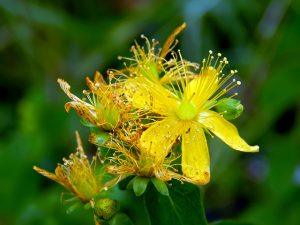
St John’s Wort – sources, health benefits, nutrients, uses and constituents at NaturalPedia.com
Wednesday, August 09, 2017 by Earl Garcia
http://www.naturalpedia.com/st-johns-wort-sources-health-benefits-nutrients-uses-and-constituents-at-naturalpedia-com.html
St. John’s wort is a trophorestorative herb like nettle and hawthorn, which means that it helps address the weakness of an organ or a system. The plant has been used as a natural treatment since ancient times, particularly in Europe. The medicinal herb is known to bloom around the summer solstice. According to the Herbal Remedies Advice website, the plant is characterized by its bright yellow flowers that exude a red stain when crushed, hence its name taking after the Christian martyr, because St. John the Baptist was beheaded for not renouncing his faith.

List of known nutrients
St. John’s wort is a well-known herb that contains many important compounds that addresses a variety of diseases. An entry posted on Herbpathy.com lists all the essential components found in St. John’s wort, which include:
- Carotenoids
- Caryophyllene
- Chlorophyll
- Choline
- Essential Oil
- Flavonoids
- Hyperoside
- Isoquercitrin
- Kaempferol
- Limonene
- Lutein
- Mannitol
- Myristic Acid
- Phenol
- Phenolic Acid
- Phloroglucinol
- Phytosterol
- Proanthocyanidins
- Procyanidins
- Quercetin
- Quercetrin
- Rutin
- Saponins
- Sterols
- Tannins
- Vitamin A
- Vitamin C
- Xanthones
Medicinal uses for St. John’s wort
St. John’s wort is best known for its beneficial effects to the nervous system. The medicinal herb is found to contain anti-depressant properties that help relieve symptoms of depression. According to an article on the Organic Facts website, the herb boasts with a rare combination of anti-depressant compounds that mitigate the re-uptake of certain neurotransmitters like serotonin, dopamine, and norepinephrine. This, in turn, gives the body additional energy and helps stave off depressive symptoms. The plant is also found to boost cognitive function and improve memory.
Aside from this, the beneficial plant is touted to alleviate anxiety and mood swings. The herb is shown to regulate the body’s hormonal balance and therefore promotes a healthy metabolism and a stable internal body clock. As a result, St. John’s wort helps address sleeplessness, irritability, and chronic fatigue. Likewise, St. John’s wort is notably effective in treating anxiety and mood swings in menopausal women, and ease cramping, irritation, and depression tied to pre-menstrual syndrome.The high antioxidant levels in St. John’s wort is also known to reduce neuronal degeneration associated with Parkinson’s disease.
The herb is also touted to help people recuperate from addiction and withdrawal symptoms after quitting smoking, alcohol, and addictive substances. In addition, the plant contains potent antiviral and antibacterial properties that protect the body against acquired immune deficiency syndrome (AIDS), hepatitis, and other fatal viral conditions. Furthermore, the herb is also known to help fend off cancer, hypothyroidism, and pregnancy pains.
Furthermore, St. John’s wort is found to contain strong anti-inflammatory and antioxidant compounds that help soothe pain linked to arthritis, gout, joint discomfort, and muscle soreness. Likewise, these compounds are shown to reduce inflammation in the skin and guts. Additionally, the herb’s anti-inflammatory compound helps prevent high blood pressure and cardiac stress. The plant is also notably effective in easing irritable bowel syndrome.
Body systems supported by St. John’s wort
St. John’s wort is particularly beneficial to the nervous system. Likewise, the herb also supports the digestive, cardiovascular, and skeletal systems. In addition, the plant promotes the muscular, endocrine, and female reproductive systems.
Ways to use St. John’s wort
St. John’s wort is best enjoyed as an herbal tea. This brewed drink is known to help ease a host of ailments ranging from nervous tension to coughing fits and migraines. An article posted on the Grandma’s Wisdom website features a step-by-step guide in making St. John’s wort tea.
Where to learn more
- Is St John’s Wort Safe and Effective For Depression and Anxiety.
- St. John’s Wort proven more effective than antidepressant drugs for treating depression
- St. John’s Wort Again Proven Better than Antidepressant Drugs
- Zap your depression with St. John’s Wort, a centuries old medicinal herb proven to make you smile
- Incurable brain tumor breakthrough – St. John’s wort compound discovered as promising treatment
Summary
St. John’s wort relieves depression, cardiovascular diseases, and Parkinson’s disease.
St. John’s wort addresses menstrual issues, arthritis, and digestive conditions.
St. John’s wort prevents cancer, hypothyroidism, and pregnancy pains.
St. John’s wort benefits the nervous, digestive, cardiovascular, and skeletal systems
St. John’s wort also supports the muscular, endocrine, and female reproductive systems.
Sources include:
Tagged Under: Tags: St. John's wort





